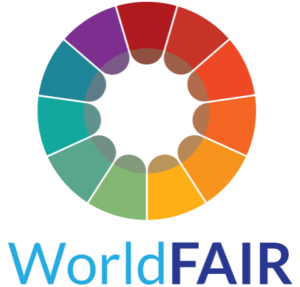 WorldFAIR — the flagship project of the CODATA Decadal Programme, “Making Data Work for Cross-Domain Grand Challenges” — has had a busy start to 2024. In the first three months of the year, we have published eight new reports: for agricultural biodiversity, chemistry, geochemistry, nanomaterials, and social studies research. All these outputs are freely available online.
WorldFAIR — the flagship project of the CODATA Decadal Programme, “Making Data Work for Cross-Domain Grand Challenges” — has had a busy start to 2024. In the first three months of the year, we have published eight new reports: for agricultural biodiversity, chemistry, geochemistry, nanomaterials, and social studies research. All these outputs are freely available online.
Agricultural biodiversity:
- WorldFAIR (D10.2) Agricultural Biodiversity Standards, Best Practices and Guidelines Recommendations. This new report presents the results from six pilot studies adopting standards and recommendations from our discovery phase. More: https://doi.org/10.5281/zenodo.10666593.
Alongside this report is a Tutorial that facilitates the standardisation of any spreadsheet containing plant-pollinator interaction data, and assists in sharing the final product in the REBIPP or other platforms. More: https://doi.org/10.5281/zenodo.10688865
- WorldFAIR (D10.3) Agricultural biodiversity FAIR data assessment rubrics. Introduces a set of FAIR assessment tools tailored to the plant-pollinator interactions domain, to help researchers and institutions evaluate adherence to the FAIR principles. More: https://doi.org/10.5281/zenodo.10719265
Chemistry:
- WorldFAIR (D3.2) Training Package: FAIR Chemistry Cookbook. This “Cookbook” trains various user groups in the chemical sciences in the FAIR principles and machine-readable chemical data. It serves as a toolbox of interactive recipes for implementing FAIR at various levels and for various users. More: https://doi.org/10.5281/zenodo.10711950
- WorldFAIR (D3.3) Utility services for Chemistry Standards. Criteria for web-based services that organisations can implement based on preferred technologies (e.g., toolkits, programming languages). The services are intended to confirm chemical identity and provide feedback on the machine-readability of chemical data and metadata representations based on IUPAC standard rule sets and community best practices, to support a range of stakeholders engaging in chemical data exchange online. More: https://doi.org/10.5281/zenodo.10514901
Geochemistry:
- WorldFAIR (D5.2) Geochemistry Methodology and Outreach. Advocating the utility and significance of FAIR Implementation Profiles (FIPs) for the geochemistry community, and presenting a set of policy and organisational recommendations. More: https://doi.org/10.5281/zenodo.10406332
- WorldFAIR (D5.3) Guidelines for implementing Geochemistry FIPs. We guide the geochemistry data infrastructure community towards convergence by identifying FAIR Enabling Resources (FERs) in current use by the geosciences community. We propose creating a reference FIP or catalogue of FERs to promote interoperability and prevent duplication of efforts. More: https://doi.org/10.5281/zenodo.10712808
Nanomaterials:
- WorldFAIR (D4.2) FAIRification of nanoinformatics tools and models recommendations. Targeted towards nanoinformatics model developers, this report presents a set of recommendations and prototypes for FAIRification of nanoinformatics tools and models. The focus is on tools and software primarily, and also FAIRIfication of the underpinning (and resulting) datasets. More: https://doi.org/10.5281/zenodo.10629631
Social studies:
- WorldFAIR (D6.3) Pilot Testing Harmonisation Workflows. We test the use of standardised workflows based on registry services available at the Australian Data Archive (ADA) and Sikt through their respective Colectica registries. The workflow steps are piloted with the International Social Survey Program (ISSP), to evaluate the Cross-Cultural Survey Harmonisation workflow as a suitable process for machine-to-machine based survey harmonisation. More: https://doi.org/10.5281/zenodo.10724744
For more on all things WorldFAIR, visit us online at http://worldfair-project.eu.
WorldFAIR is funded by the EC HORIZON-WIDERA-2021-ERA-01-41 Coordination and Support Action under Grant Agreement No. 101058393.
